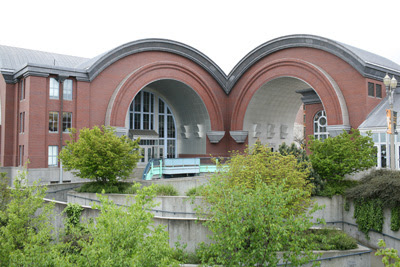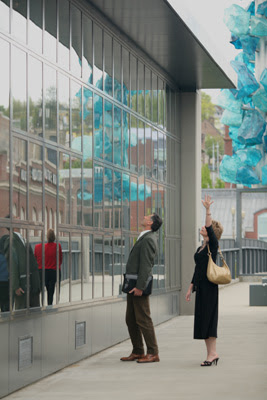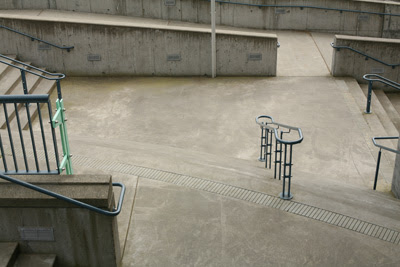The TV show ER used to be a favorite of mine until the character Dr. Greene (Anthony Edwards) died. And while there are a lot of episodes I like , the final episode of Dr. Greene death is my favorite. It occasionally it shows up on reruns to remind me why. It's a show about life and death, his death and the on-going life of those he loved and loved him. Ok, it's TV, but it's still a good episode about dying in peace. And that's why I like it.
My older brother died at the age of 47, August 21, 1991. It was the day I bought my 1991 VW Vanagon Syncro, the car I always wanted since the late 1960's, and settled for a 1971 VW Bug. The first drive home from the dealer was to the airport to catch a flight to Kansas City for his funeral. Another early trip in the van was to the ocean to deliver flowers from the funeral to the sea off Westport, Washington. He never saw the Pacific Ocean. He always wanted to, and the only time he was on the West Coast he didn't get the time off to go.
And why the show? Well, my brother was a type A personality, the first son who was supposed to achieve what Dad thought was good and right. From the age of 17 or so, it was clear to some of us, he didn't want to achieve, but find some level of comfort in life. He came close for a short time in the 1970's living in Crested Butte, Colorado, a place he really loved, and where his ashes were delivered to the Gunnison River, his favorite fishing place.
But he soldiered on as they say and became the Treasurer and then CEO of AMC Theater Company before being axed in a takeover he negotiated. He went through a few jobs after that for the last few years of his life to settle on a job he hated as the CFO of a trucking company. One day, for the first time in his working life, he came home for lunch. Being a workaholic he never did this, to the surprise of Jo, his wife, and his children.
After a short conversation with them, he sat down on the couch, lit a cigarette (being a 20+ years 2 pack a day smoker), and had a heart attack. The Coroner discovered his lungs were over half filled with liquid, needing a heart-lung transplant, his physician told him was necessary if he wanted to live very long. He declined and at home left us to his own world of peace.
While we rarely spoke over the years, when we did it was for hours on end about life. I still and always will miss him. He knew he was dying and that morning knew death was on his shoulder, and he chose the place to die. We could all ask as much.
Well, my Dad never recovered from his death, and afterward only spoke to me a few times. He didn't want to outlive his son, the one he placed so much in. In the time in between my brother's death and his death, he quietly admitted to me that I wasn't the son he wanted. Mom and Dad only wanted two children and I being the third wasn't wanted, so both of them left me to my own devices to grow up, mostly by my siblings and the school system, until I was told to leave at 19 (long story to come later).
Well, Dad had three goals late in life, after being forced to retire at 62. He wanted to pay off the mortage for the only house he ever bought, celebrate his 50th wedding anniversary, and get to his 75th birthday. He had a 5-way heart bypass at 73 so he could live longer. At 74 he came for a stopover visit on the way to Alaska, which I wrote a
poem about his overnight stay.
The day after his 75th birthday, he refused to get out of bed. He fell into a deep sleep and died two days later. I wasn't there as Mom said it didn't matter, he didn't wake up and kept talking to people long since dead. He chose the time and place of his death. We wished him peace, and I hope he found some solace with his God for later I would learn why from Mom.
You see Dad and I lead similar lives in our youth. He was the third child, second son, and his Dad rejected him over the older son. He also was kicked out of the house after his first year of college, and in 1939, it was not a good time to be alone in the world. So he joined the Army and rarely went home. He missed his father's funeral and never spoke of him, only his Mom who lived into her 80's.
We were similar in that I'm the third child, second son, and my Dad rejected me over my brother. He also kicked me out of the house at 19, and in 1968, it wasn't a good time to be 1-A in the draft. He did to me what his father did to him, history repeated itself in our lives, almost to the same circumstances. I joined the Air Force, to avoid the draft, for my Vietnam years. Our lives went in different directions after that, but the relationship between us wasn't that much different, only when each of our dad's died.
My Mom only passed away last year of a stroke and heart attack at the age of 85. We spoke routinely along with letters I sent about monthly. I never saw her after Dad's funeral, twelve years I deeply regret not doing. She understood why. We had to endure living with grandmothers outliving their husbands and settling in with my parents for long periods of time, before one went home to Kansas to die in the only home she knew and the other to a nursing home.
And so this episode of ER has some personal meaning to me, a reminder of lives past and life passing.


















